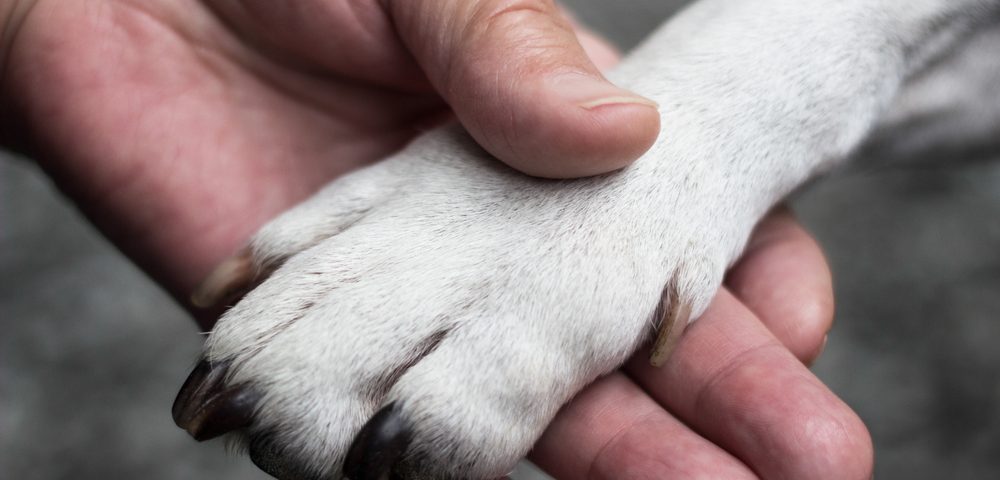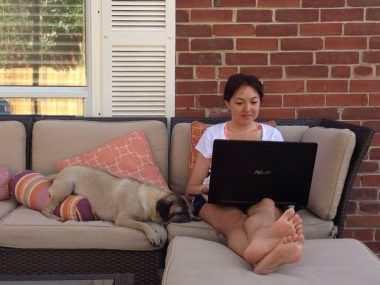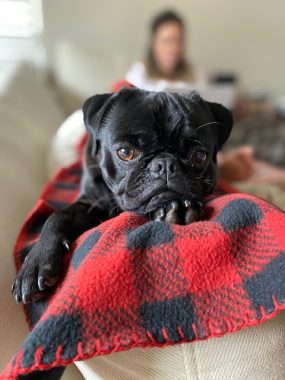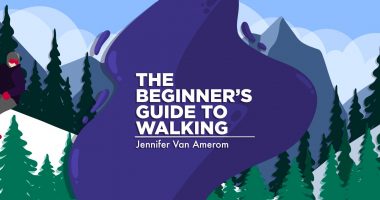How Pets Can Benefit People With Disabilities

sanjagrujic/Shutterstock
Sometimes in life, the easiest decisions make the greatest impact.
It probably wasn’t reasonable for a new couple to get a dog together, but that’s exactly how Marmaduke came into our lives. A wild idea led to an internet search, and as luck would have it, we were able to visit the home of a schoolteacher and experienced pug breeder the next day.
I’ll never forget that visit. We waited in her backyard, then a gate opened, and a large litter of fawn puppies scurried toward us. Wearing colored ribbons to identify them, they were suddenly distracted by the breeder’s cat, who bravely flicked her tail while sunbathing in the distance. This they found too enticing and they redirected toward her — all except one, “Mr. Blue.” As I sat in the grass, Mr. Blue sauntered over and crawled into my lap. He picked me.
I always joke that Marmaduke, aka Mr. Blue, was responsible for my relationship with my husband, Mike. We fell madly in love with our pug, and he gave us a reason to get over our early relationship challenges. Raising Marmaduke together also helped us recognize that while neither of us is perfect, we are for each other.
Years later, when I found myself in the hospital facing my first neuromyelitis optica (NMO) episode, I struggled with the reality of my condition. One night, thanks to a plan concocted by my husband (then my fiancé), my family snuck Marmaduke into the hospital lobby. I didn’t realize how much I’d missed him until I rolled up in my wheelchair and he jumped into my lap. We both squealed with delight. He helped me realize there was still life to live and walks to take.

Jennifer and Marmaduke work together in her backyard. (Photo by Mike Drolet)
Marmaduke never judged me for the steroid-induced weight I gained and then lost. He never made me explain what NMO is, or how I felt about my diagnosis. He never made me feel guilty if I needed to sit on the couch all day — he’d just join me. If my cane, walker, or wheelchair pinched one of his little paws, he’d yelp, jump back, and immediately forgive me.
Thousands of tears have soaked into the furry folds on the back of his neck. He’d shake them off and let me hug him for as long as I needed to, never judging me when I felt sorry for myself. Marmaduke always waited for me, or with me on lonely days when I was house-bound. In public, he could be leash-free and never strayed more than 3 feet from my side.
Marmaduke passed away at the start of 2020. Not a day goes by when I don’t miss him. That’s not something I usually say out loud, because many find grieving for “just a pet” excessive, especially after more than a couple weeks. But to me, Marmaduke was so much more than a companion. In my darkest moments with this disease, he never stopped treating me like me.
As my body changed over the years from repeated episodes and recoveries, my dog loved me unconditionally. Saying “see you later” to him was one of the hardest moments of my life. The memory still makes me cry. While I wish he could have stayed with me just one more day, hour, or even a few more seconds, I knew when it was my turn to love him back unconditionally, and it broke my heart.
We lasted just a few months before my husband conceded that we needed a dog in our home. My husband and I are confident in our marriage, recognizing that one person cannot and should not be responsible for providing everything to the other. It wasn’t until Marmaduke was gone that we both realized how many roles he played in my life.
Now we have Sir Magnus, our almost 2-year-old black pug. His personality is nothing like Marmaduke’s, as he is special in his own way. Magnus is stubborn, shy, and has natural comedic timing. At the start of the pandemic, Magnus filled our home with much-needed distraction and has never stopped.
While he’ll never replace Marmaduke, I have discovered that my heart has the capacity to love more. Magnus creates a new joy in my life — I get to watch him and our daughter grow up together. While the comfort he provides her is different, it is also familiar.

Jennifer’s pug Sir Magnus. (Photo by Mike Drolet)
Several organizations can provide accreditation for your pet. To me, “emotional support animal,” “anxiety relief dog,” or even “animal companion” feel like inadequate terms. Pets are more than support for our mental and physical health. For the disabled, our pets become part of us and are often the only ones who see past our illness, especially at times when we can’t see beyond it ourselves.
***
Note: Neuromyelitis News is strictly a news and information website about the disease. It does not provide medical advice, diagnosis, or treatment. This content is not intended to be a substitute for professional medical advice, diagnosis, or treatment. Always seek the advice of your physician or other qualified health providers with any questions you may have regarding a medical condition. Never disregard professional medical advice or delay in seeking it because of something you have read on this website. The opinions expressed in this column are not those of Neuromyelitis News, or its parent company, Bionews, and are intended to spark discussion about issues pertaining to neuromyelitis optica spectrum disorder (NMOSD).







Comments